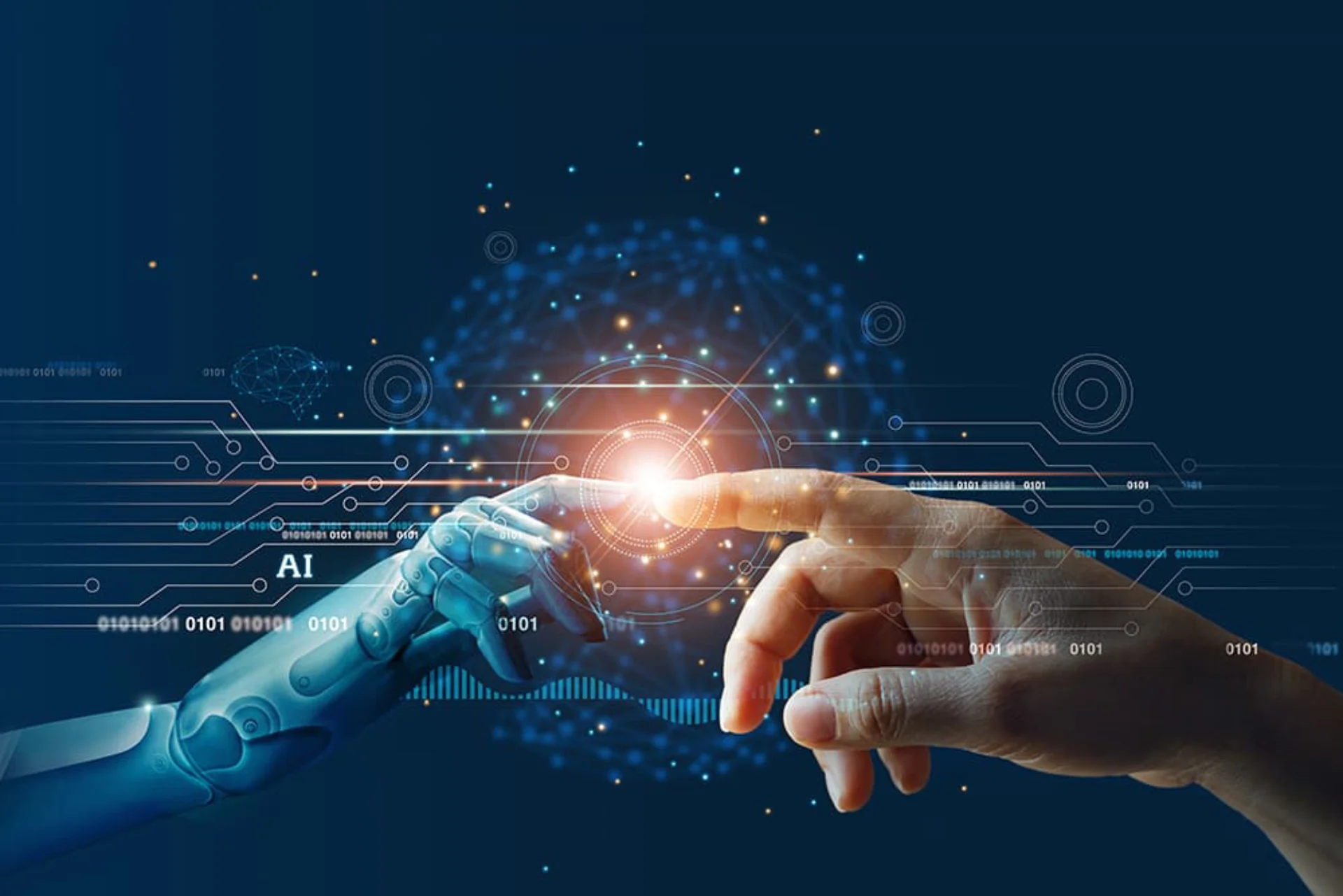The Future of Artificial Intelligence and Machine Learning in IT
In the area of information technology (IT), artificial intelligence (AI) and machine learning (ML) have quickly become transformational technologies. Their applications include transforming entire industries and changing how companies run. The future of AI and ML in IT has a lot of potential and intriguing possibilities, as we look ahead.

Introduction to AI and ML in IT
Artificial intelligence is the image of human intelligence in devices that have been designed to reason and reach knowledge likewise to someone. On the other hand, machine learning is a branch of artificial intelligence that focuses on making it possible for machines to learn from data and enhance their performance without being explicitly programmed.
Enhanced Efficiency and Automation
Future IT procedures will become more productive and automated thanks to AI and ML. The optimization of numerous tasks, including data analysis, system monitoring, and cybersecurity, will be achieved by intelligent algorithms and predictive models. Businesses will benefit from increased productivity, lower expenses, and quicker decision-making as a result.
Intelligent Chatbots and Virtual Assistants
Virtual assistants and chatbots powered by AI are becoming more and more common in the customer service and service sectors. Intelligence These conversational agents will evolve in the future, using ML algorithms to comprehend and react to challenging questions. The development of natural language processing (NLP) will allow for more human-like interactions, providing individualized support and improving consumer experiences.
Predictive Analytics and Business Insights
AI and ML methods are excellent at drawing useful conclusions from enormous volumes of data. By providing organizations with predictive analytics capabilities in the future, these technologies will enable them to make data-driven decisions. Businesses will use AI-driven algorithms to spot trends, predict patterns, and gain a competitive advantage by anticipating consumer demands.
Smarter Cybersecurity Measures
The risks and difficulties in the cybersecurity field evolve with technology. Intelligence IT systems will need to be strengthened against cyberattacks using AI and ML. Algorithms for machine learning will continuously examine network trends, spot anomalies, and take preventative action against new threats. Sensitive data will be protected, and the overall security posture will be improved.
Personalized User Experiences
Across a range of IT platforms, AI and ML have the potential to revolutionize user experiences. These technologies will eventually make it possible to deliver customized material, deliver personalized recommendations, and create adaptable interfaces. AI algorithms will provide highly customized experiences by examining user behavior, preferences, and previous data, which will increase consumer satisfaction and engagement.
Autonomous Vehicles and Transportation
The development of autonomous cars and the transformation of the transportation sector are being led by AI and ML. Intelligent traffic management systems and self-driving automobiles will be more common in the future. These innovations will boost fuel economy, lessen traffic, and increase road safety. Vehicles will be able to communicate with one another thanks to AI-powered algorithms, improving transportation efficiency and environmental sustainability.
Healthcare Revolution
Healthcare AI and ML have a bright future. Precision medicine, early illness detection, and individualized patient care will all be made possible by these technologies. To make precise diagnoses and treatment suggestions, AI algorithms will examine enormous amounts of medical data, including clinical studies, genetic data, and electronic health records. This will result in better medical outcomes and could even save lives.
Ethical and Social Implications
The ethical and social ramifications of AI and ML’s development must be carefully considered. Fairness, privacy, and responsibility must be guaranteed by ethical frameworks and laws for these technologies to be developed and used responsibly. The establishment of rules and standards for the use of AI and ML will depend heavily on collaboration efforts between industry leaders, policymakers, and researchers. Addressing challenges like algorithmic prejudice, data privacy, and the potential effects of automation on the workforce will be crucial. We can ensure that AI and ML technologies are created and implemented responsibly and inclusively by proactively addressing these concerns.
Continuous Advancements and Innovation
Constant innovation and breakthroughs will define the use of AI and ML in IT. The capabilities of AI systems will advance along with technology. Intelligence There will be advancements in fields like deep learning, computer vision, and natural language understanding as a result of ongoing research and development. These developments will expand the potential applications and opportunities across numerous industries, pushing the limits of what AI and ML are capable of.
Automation and Streamlined Workflows
Different IT operations can be automated and streamlined using AI and ML, boosting productivity. Intelligent algorithms can be used by organizations to automate repetitive operations like data entry and system maintenance, freeing up IT specialists to work on more important projects. Customer service can be improved by utilizing AI-driven chatbots and virtual assistants, which can respond to consumer inquiries more quickly and accurately. By optimizing resource allocation and enhancing overall business performance, automation transforms Intelligence IT operations.
Data Analytics and Insights
AI and ML are essential tools for gaining relevant Intelligence and facilitating data-driven decision-making in the age of big data. Massive datasets can be processed and analyzed by these technologies, revealing patterns and trends that people might not notice. Organizations can detect client preferences, generate accurate predictions, and adapt their strategy by utilizing AI and ML algorithms. Businesses can stay ahead of the curve, adjust to shifting market dynamics, and provide customers with greater value thanks to data analytics powered by AI and ML.
Cybersecurity and Threat Detection
AI and machine learning (ML) have become effective tools in the battle against cybercrime as a result of the growing sophistication of cyber threats. With threats developing quickly, traditional security methods frequently find it difficult to keep up. On the other hand, AI and ML Intelligence algorithms have a high degree of accuracy in the detection of abnormalities, the recognition of patterns, and the prediction of possible breaches. Organizations may strengthen their defenses, proactively address attacks, and protect sensitive data by utilizing these technologies. The application of AI and ML to cybersecurity in the future promises to produce reliable systems that are constantly evolving to fend off new attacks.
User Experiences That Are Personalised User experiences could be revolutionized by AI and ML if they can deliver customized and individualized interactions across numerous touchpoints. Organizations can provide individualized recommendations, information, and services that Intelligence are catered to individual interests by analyzing enormous amounts of customer data. E-commerce platforms, for Intelligence, can use ML algorithms to provide product recommendations based on previous purchases and browsing habits. This degree of customization boosts user pleasure while also encouraging client loyalty and involvement, which eventually promotes business success.
Natural Language Processing and Voice Interfaces
Improvements in Natural Language Processing (NLP) and voice interfaces will be part of the future of AI and ML in IT and will allow for seamless human-computer Intelligence. Communication between people and IT systems is made easier by NLP algorithms’ capacity to comprehend and analyze human language. AI-powered voice interfaces can understand spoken commands, allowing for hands-free operation and a more natural user experience. These developments, which range from virtual assistants to smart home appliances, lay the way for a time when technology can comprehend human wants and respond to them conversationally and naturally.
Enhanced Predictive Analytics
Predictive analytics holds enormous potential for AI and ML, enabling businesses to foresee future trends and make data-driven decisions. Organizations may foresee market trends, anticipate customer behavior, and adapt their strategy by using historical data and cutting-edge algorithms. Improved predictive analytics can completely transform sectors like finance, retail, and marketing by empowering companies to proactively handle problems and seize opportunities. Predictive analytics in the future is expected to be a game-changer, providing organizations with useful information for making strategic decisions.
Autonomous Vehicles and Intelligent Transportation Systems
Through the creation of autonomous cars and Intelligence transportation systems, artificial intelligence, and machine learning are revolutionizing the transportation sector. Advanced AI algorithms are being added to self-driving cars, trucks, and drones so they can navigate challenging situations, study traffic patterns, and make quick choices. These self-driving cars have the power to transform logistics while also enhancing traffic flow and road safety. Additionally, AI-driven intelligent transportation systems may manage infrastructure, improve overall transportation efficiency, and optimize traffic flow, resulting in more connected and sustainable cities.
Healthcare Revolution through AI and ML
The development of AI and ML technologies will have a significant positive impact on the healthcare sector. AI and ML can completely transform the way healthcare is provided, from early disease identification to personalized therapies. To find trends and forecast disease outcomes, machine learning algorithms can analyze medical data, such as patient records, imaging scans, and genetic information. This enables medical personnel to diagnose patients more correctly, provide individualized treatment strategies, and enhance patient outcomes. Robotics and virtual assistants powered by AI can also help with procedures, monitor patients, and improve the effectiveness of all healthcare operations.
Conclusion
There are several promising possibilities for artificial intelligence and machine learning in the IT industry. Businesses will benefit from increased efficiency, automation, and insights thanks to these transformational technologies. They will revolutionize healthcare, provide personalized user experiences, and promote safer and more intelligent transportation. To ensure the proper development and application of these technologies, it is crucial to address the ethical and social ramifications. We can create a future in which AI and ML enable us and improve society by embracing their promise while taking into account the difficulties that come with it.


